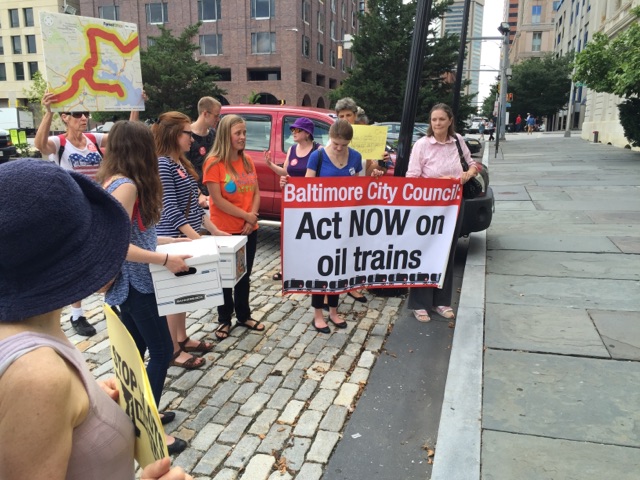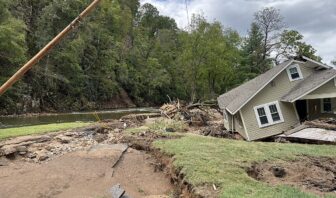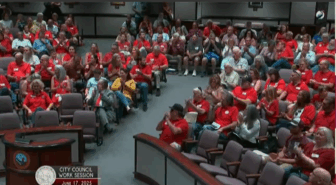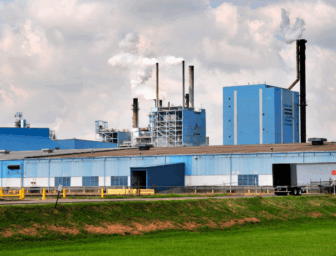Baltimore City Councilmembers Mary Pat Clarke and Edward Reisinger will introduce a crude oil terminal prohibition to protect the 165,000 Baltimoreans who are threatened by trains carrying explosive crude oil through the city.
BALTIMORE, MD — Today, City Councilmembers Mary Pat Clarke and Edward Reisinger will introduce a bill to prohibit the construction of new and the expansion of existing crude oil terminals in Baltimore City. City Council Bill #17-0150 defines crude oil terminals as a prohibited land use in the city’s zoning code and if passed, would prevent Baltimore City from becoming a hub for crude oil train transfers – a fate that would put neighborhoods along the train route at significant risk.
Councilman Edward Reisinger of Baltimore’s 10th District and bill co-sponsor, said, “Most of my district is within one mile of the tracks that crude oil has been transported on. I don’t want any more crude oil tank cars putting the neighborhoods in my district at risk.”
Transport of crude oil by rail skyrocketed in the midst of the fracking boom in the Bakken shale fields of North Dakota, and a string of destructive derailments has followed. Crude oil has been known to travel through Baltimore City, and there are two terminals currently permitted to ship crude oil in the city.
165,000 Baltimoreans live in the crude oil train “blast zone” – the area that could be directly impacted if a train were to derail and explode in the city. There have been many close calls with freight trains in Baltimore, including last year’s derailment of 13 train cars in the Howard Street Tunnel.
Councilwoman Mary Pat Clarke, representative of Baltimore’s District 14 and bill sponsor, said, “In a time of low demand, this legislation freezes in place our current capacity for crude oil storage and transfer. When the next boom comes, this limited capacity will help to protect Baltimore from crude oil train hazards.”
To date, 24 religious leaders in Baltimore City have signed onto a letter urging the City Council to support the bill. Their letter reads: “We sign this letter as faith leaders whose communities would be directly endangered by crude oil trains … We have a responsibility to protect our neighbors inland from the Port of Baltimore. Any terminal that continues to enable the burning of fossil fuels is to us a ‘dangerous object.’”
This bill is being introduced during criminal trials concerning the crude oil train derailment that occurred in Lac-Megantic, Quebec, in 2013 that killed 47 people. Although it is clear that lax regulations and unsafe railroad management policies led to the tragedy there, two railroad workers are being blamed for the explosion. This incident stands as a reminder that crude oil trains are unsafe for our communities, for our workers, and for the environment and also demonstrates the potential litigation that would result from a derailment and of the rail carriers’ proclivity for avoiding responsibility.
Background: In 2014, a Texas-based company called Targa Terminals applied for a permit to ship crude oil through an additional terminal in South Baltimore. If approved, the terminal could have brought an additional 380 million gallons of explosive crude oil through the city’s rail lines every year.
The Maryland Department of the Environment denied that permit after it found the company did not meet air pollution requirements. The zoning ordinance introduced on Monday would prevent any future crude oil terminals from being constructed in the city, thus preventing an increase in crude oil train traffic.
In June, the Baltimore City Council unanimously passed a Climate Resolution that outlined specific steps the City should take to protect residents from the impacts of climate change. The resolution notes that crude-by-rail traffic enables “the extraction and combustion of some of the most climate-polluting oil on the planet” and calls for the City to “limit the development and expansion of facilities that handle crude oil.” This crude oil terminal prohibition is an opportunity for the Council to follow through on that commitment.
Baltimore’s terminal prohibition bill follows similar efforts to zone out crude oil terminals around the country. In 2016, Portland, Oregon and Vancouver, Washington passed zoning code changes to protect their residents from dangerous and polluting fossil fuel infrastructure.
FOR IMMEDIATE RELEASE: October 16, 2017
CONTACT:
Jennifer Kunze; Clean Water Action; 240-397-4126; jkunze@cleanwater.org
Taylor Smith-Hams; Chesapeake Climate Action Network; 650-704-3208; taylor@chesapeakeclimate.org
###





